JENNIFER IN TWO VOICES I know why the sky sings the blues -- for you, Jenny, for you -- atmosphere breaks down and cries. Once the wind must have had your voice: Wind makes my soul rejoice to hear your echo once more. Your precious beauty to preserve, earth freezes to its nerves in ecstasies of ermine. And the waves for you outreach -- the sea begs up the beach, hands-&-knees its way in pride. And trees have honored you in gold, red carpets where you rode, jade ceilings and emerald floors -- nature's learned your lesson well how to be beautiful: your appearance is your sermon. I know why the sky sings the blues -- for you, Jenny, for you -- atmosphere breaks down and cries. (Across the landscape many-firred, atmosphere breaks down and cries,) Once the wind must have had your voice: Wind makes my soul rejoice to hear your echo once more. (urges us make love manifold. To hear your echo once more) Your precious beauty to preserve, earth freezes to its nerves in ecstasies of ermine. (among the creeks and conifers in ecstacies of ermine.) - And the waves for you outreach -- the sea begs up the beach, hands-&-knees its way in pride. (in fields of foxes henna-furred -- I hands-n-knees my way inside) And trees have honored you in gold, red carpets where you rode, jade ceilings and emerald floors -- (where moist warmth is plentiful. On jade ceilings & emerald floors,) nature's learned your lesson well how to be beautiful: your appearance is your sermon. (raven-eyed/lynx-face Jennifer: Your appearance is your sermon.) Across the landscape many-firred, atmosphere breaks down and cries, urges us make love manifold. To hear your echo once more among the creeks and conifers in ecstasies of ermine, in fields of foxes henna-furred -- I hands-n-knees my way inside where moist warmth is plentiful. On jade ceilings & emerald floors, raven-eyed/lynx-face Jennifer: Your appearance is your sermon. TIMES AS GOLDEN CALVES Plaster casts and black sutures cohabit with surgeons’ masks. Doctors lift up their scalpel like an execution axe in service of ice sculpture. They daydream of parachutes to hurtle them through their clouds. And the butcher is carcass, as the treaty is the war, or the poacher is his traps. The scarecrow loves the crow, and the shooter shares the blast. Ventriloquist is dummy when a be stops becoming. Views of peasant and castle once framed the common outlook, as though the sheep needed wolves, as though serfs needed dukes, to justify how their gulf would link prey to predator by way of divine order. All the pasts have their futures and all futures have their pasts. But the present is itself. MUSHROOMING If you were forest I could purport this noble purpose for these frequent meticulous surveys that I perform throughout your moist and fetid shadows. RUBICON Each dawn comes embarrassed. Time rearranges us, from chaos to chaos. Our memories are ghosts of what were once our pasts before structures collapsed. Infinities of if permit change to exist. Wisdom becomes mischief. Stoics become criers in meditation choirs for umbilical pyres. Even the Rubicon once got lost in the swamps and then was retro-conned. Destiny is not fact. Fates are carefully stacked by gambling architects to construct poker fraud. Certainty’s a façade, installed by clever gods. Time rearranges us. From chaos to chaos, each dawn comes embarrassed. QUATRAINS, EXPLICATION You kissed me in your garden, and then you tortured me. I learned in your orchard belief forestalled pardon. With the heat of parenthood you loved me at once then suddenly took affront when I ate what was good. Your day hovered, stern and still after the roosters crowed. I staggered to the crossroad that led up to the hill. My sweetest tree lost its leaves, my rose just yielded thorns. My clothes were raffled and torn by guards who were thieves, while a thief gave me succor. By comrades unfriended, my murder unattended but for mother and whore. It’s the gravel in the rattle the critics listen for, the riddle at the middle of poetry. That’s the ambiguity that they adore. You planted my temptation, knowing I would fail, then carpentered the nails for my situation. You were judge and betrayer, prosecutor and crowd, you, the weaver of my shroud, the author of my prayers. I was Jesus and Adam, pillars of your temple, my deaths your staged examples. But I am yet a man.
Category Archives: CHAOS
Poetry from Eva Petropoulou Lianou

Mama Mother is the doctor for any sickness Mama is the country that everyone loves without conquering Mama is joy and sorrow Mama the power Mama the forgiveness One word was created by God To forgive people Say it every day Call her if they put chains on you To sweeten it the wound To bring peace My mom, you're unique You never told them you were upset With gold I will cherish you Chosen person I crown you My mother My sun My compass © Eva Petropoulou Lianou Greece Mama Mama ni daktari kwa ugonjwa wowote ule Mama ni nchi ambayo kila mtu ana penda bila ushindi Mama ni furaha na uzuni Mama, nguvu Mama, musamaha Neno muja ila umbwaka na mungu Kuwasamehe watu Iseme kila siku Mwite Kama wana kuzingira minyororo Kuweka kidonda afazali Kuleta amani Mama yangu, uko wa pekee Aujawezaka wambiye kama umekesirishwa Na zahabu nita ku penda na kukujali Mtu aliye chaguluwa, Nakuvisha taji mama yangu Juwa yangu Muongozo wangu "Mama" a poem "Mama" written by Eva Petropoulou Lianou Greece Translated into Swahili, the most African spoken language by a Congolese Refugee ©®Charles Lipanda Mahigwe (Malawi) African Youth Artistic Poetry - AYAP Charles Lipanda Mahigwe President

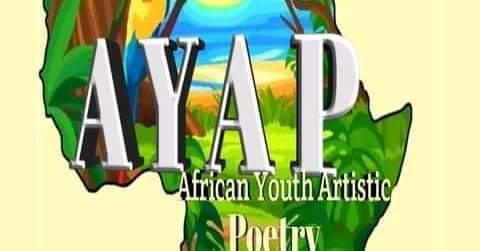
Poetry from Maja Milojkovic
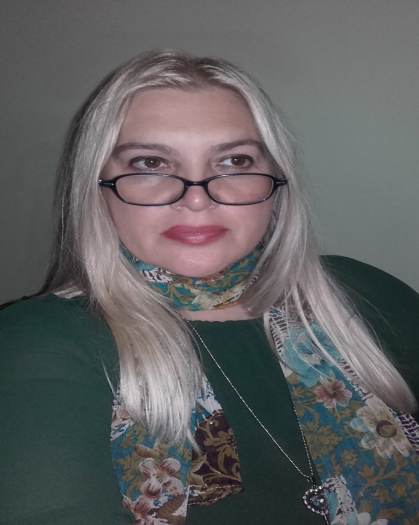
HOURGLASS As if your wishes touch me on this winter night, and our bodies are not the limit, there is soul touch without physical touch. Winter melts from our smiles, joy is multiplied by sweet words. I imagine...an hourglass that measures the time in each grain of sand, but time does not stop, because our thoughts turn that clock over and over again. I want time to stop, for us. Maja Milojković was born in 1975 in Zaječar, Serbia. She is a person to whom from an early age, Leonardo da Vinci's statement "Painting is poetry that can be seen, and poetry is painting that can be heard" is circulating through the blood. That's why she started to use feathers and a brush and began to reveal the world and herself to them. As a poet, she is represented in numerous domestic and foreign literary newspapers, anthologies and electronic media, and some of her poems can be found on YouTube. Many of her poems have been translated into English, Hungarian, Bengali and Bulgarian due to the need of foreign readers. She is the recipient of many international awards. "Trees of Desire" is her second collection of poems in preparation, which is preceded by the book of poems "Moon Circle". She is a member of the International Society of Writers and Artists "Mountain Views" in Montenegro, and she also is a member of the Poetry club "Area Felix" in Serbia.
Poetry from Baratov Quvonchbek
The flower fell in love with water... To water: "I love you," he said. Water: "I love you too," he said. After some time, again to Gul Suv: "I love you," he said. Water: "I love you too," he said... The flower got sick and withered... Suv could not bear to see this situation and called a doctor. After a thorough examination of Gul, the doctor nursed Gul desperately. Water is worried: - What happened to the flower? he asked. And the doctor: - He didn't do anything, he just ran out of water. - he said... This means that love does not consist in saying, "I only love you!" Love is loving someone who you believe can give you everything... - Rumi Translated by: Baratov Quvonchbek
Essay from Nigunabonu Amirova
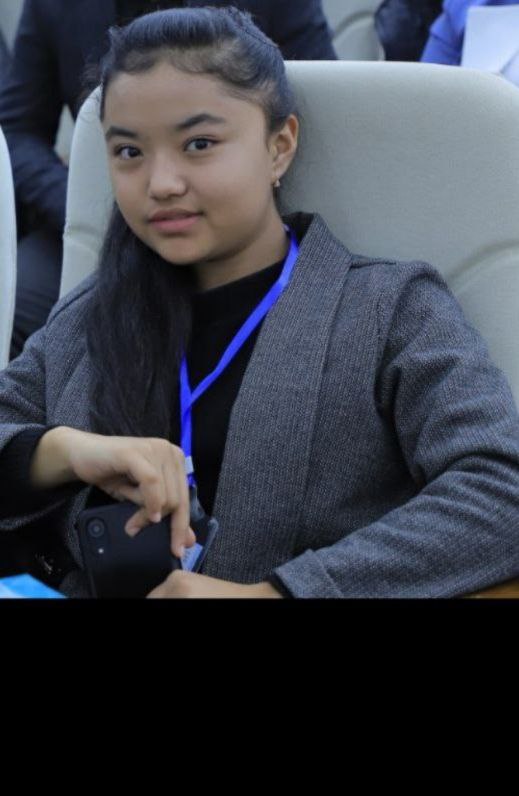
THE CURRENT UZBEK LITERARY ENVIRONMENT - IN MY INTERPRETATION
Samarkand specialized art boarding school
Improvement of the creative environment, originality, creative individuality, uniqueness, and at the same time education of the young generation in the national literary spirit.
Abstract: The improvement of the creative environment, its originality, creative individuality, uniqueness, and at the same time has its influence on the upbringing of the young generation in the national literary spirit. Today, the literary environment is developing more and getting better day by day. In this article, in addition to this, we want to talk about the activities of writers who have been contributing to today's flourishing literary environment and their creative heritage, as well as the activities of the press and mass media.
Key words: literary environment, newspapers, magazines, press, new literary environment, information flow, political sections, shows.
Therefore, before we cover the current Uzbek literary environment, it can be recognized that the world literary environment has interacted with them.
The influence of the literary environment is not small in the formation of writers who made a great contribution to the development of world literature, as well as writers whose works were read with love in smaller circles. No matter how talented a writer is, not only the educational institutions he studied in, but also the literary environment he was involved in are of great importance in the formation of his worldview and the development of his artistic skills.
First of all, let's get acquainted with the current press activity.
There are 19 republican newspapers and 2 regional newspapers in Tashkent. ("Tashkent Hakikati", "Tashkentskaya Pravda" “The reality of Tashkent”), 2 city newspapers ("Tashkent okshomi", "Vecherniy Tashkent" “Tashkent evening”), 44 mass circulation newspapers are published. 62 of the 67 magazines published in the republic are published in Tashkent. 4 information agencies operate in Tashkent.
Most of the publishing houses in Uzbekistan are located in Tashkent. Radio Tashkent occupies a leading position in radio broadcasting of Uzbekistan. For radio listeners of Tashkent city and region, broadcasts prepared by the chief editorial office of Tashkent city and Tashkent region radio stations are broadcasted every day (since 1971). The editor-in-chief has informational and socio-political departments. The editor-in-chief of Tashkent TV studio programs for residents of Tashkent city and Tashkent region prepares special program series.
TASHKENT.
Poets and writers from Tashkent will have the opportunity to publish their works in "Al-Isloh" magazine, "Taraqqi", "Khurshid", "Shuhrat", "Tujjor", "Asiyo", "Sadoyi Turkistan" newspapers. At the moment, book publishing is underway, and various books and collections are being published.
KHORASM.
The Khorezm literary environment has been one of the components of Uzbek national literature. Therefore, the general characteristics and principles of each period were reflected in the oasis literature to a certain extent. Of course, Jadidism, which is considered a phenomenon of national awakening, is not an exception. Therefore, Jadidism and its literary direction have their own history in this region. This history began with the work of Kamil Khorezmi and reached its peak in the work of Avaz, and these life-giving ideas were continued by their followers into a new reality.
ANDIJAN
Andijan is one of the regional cultural centers with its ancient traditions, which has delivered many great artists, writers and poets to our national culture, and whose cultural life is still very lively. The organizational center of the literary process is the regional branch of the Union of Writers, literary life is connected with the activities of local press publications and educational institutions. At present, well-known writers and poets such as Olimjon Khaldor, Tolan Nizam, Tursunoy Sadiqova, Zamira Rozieva, Farid Usman, Nabi Jaloliddin, Khurshidabanu live and work in Andijan. In particular, Nabi Jalaluddin's novels "Khayyom" and "The Mill" about Cholpon became a significant event in Uzbek literature.
CONCLUSION
To sum up, the capital city of Tashkent not only attracts famous writers and poets to its home, but also has an impact on their creative development. The reason is that many publications and books take a long time to be prepared in Tashkent, from being ready to being copied. In this process, it is appropriate for the author to work in Tashkent, but the emergence of publishing houses in some regions has become a problem for authors from such regions.
As for the modern literature of the literary environment, an impartial study of it on a regional scale allows to clarify some of its controversial aspects, to understand and re-evaluate its socio-aesthetic essence based on the ideology of independence, and to expand the existing ideas about the literary process of that time. In this place, the Khorezm literary environment can undoubtedly be one of the research objects.
THE LIST OF USED LITERATURE
Toshkent [ensiklopediya], T., 1992;
Azadayev F., Tashkent vo vtoroy polovine XIXveka, T., 1959;
Sokolov Yu. A..Tashkent, tashkentsi i Rossiya, T. 1965;
Dobroyemislov A. I., Tashkent v proshlom i nastoyashem. Istoricheskiy ocherk. T., 1912;
Bartold V. V., Sochineniya, 3t.; M., 1965;
Muminova R. G., Filanovich M. I., Tashkent na perekrestke istorii, T., 2001;
Poetry from Surayyo Xolmurodova
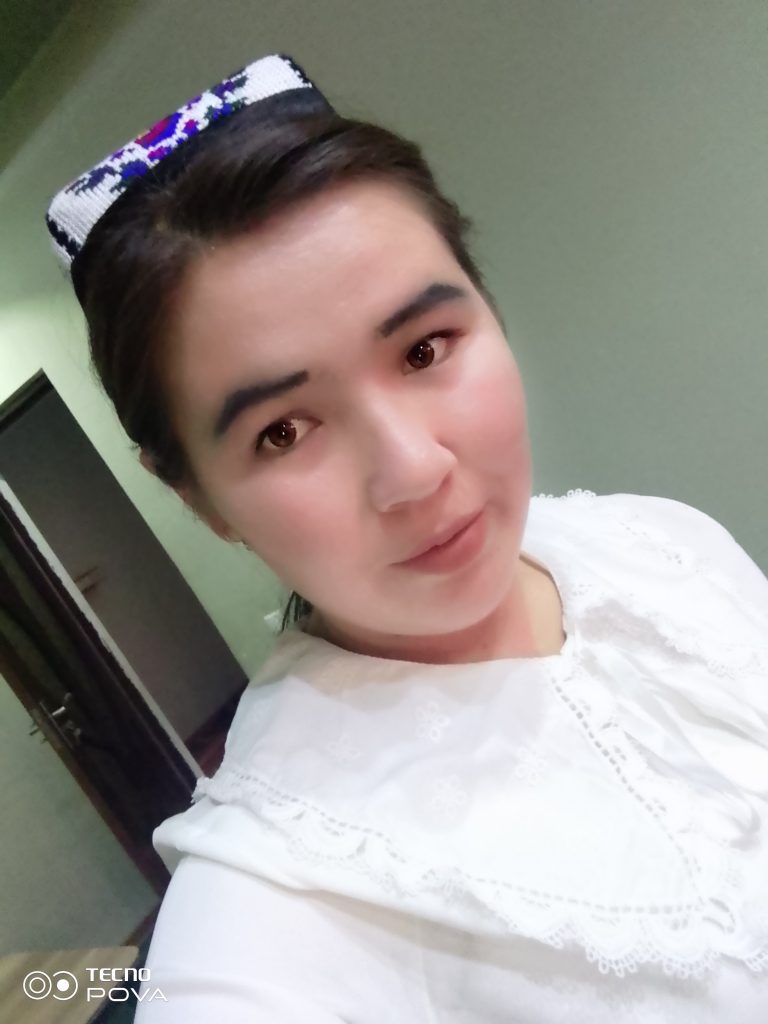
A piece of my life, from the days spent with my father. Although I am a girl who does not like simple wealth, but my heart is very delicate, because until this time, my father did not speak harshly to me, even if he beat me, he told us later why he did that. It's true that my father didn't have to explain much to us, but he told us not to get the wrong idea. From a young age, he was against us wearing shorts. And when my mother said let her dress modernly, and my father always repeated: "If your daughters wear short clothes, whatever mistakes they make, they will not be in paradise, and these walks are not suitable for us. "I liked what my father used to say. Because I felt uncomfortable when I was dressed openly. Even though they were such hard-handed people, they played with us innocently like young children, forgetting the sorrows of the world. Even now, that sincere person plays with us not as much as before, but sometimes. That day I went home, my father reprimanded my sister, she was a little upset, after two or three minutes, my father held her hand, raised his little finger as if to say peace. You see, he loves his children very much, even if he hits them a thousand times. But even if we are children, sometimes we do not know how to forget our parents little faults. Daughter of Kholmurodova Surayyo Sherzod, 2nd year student of the Shahrisabz branch of the Tashkent Institute of Chemical Technology.
Poetry from O’tkir Mulikboyev
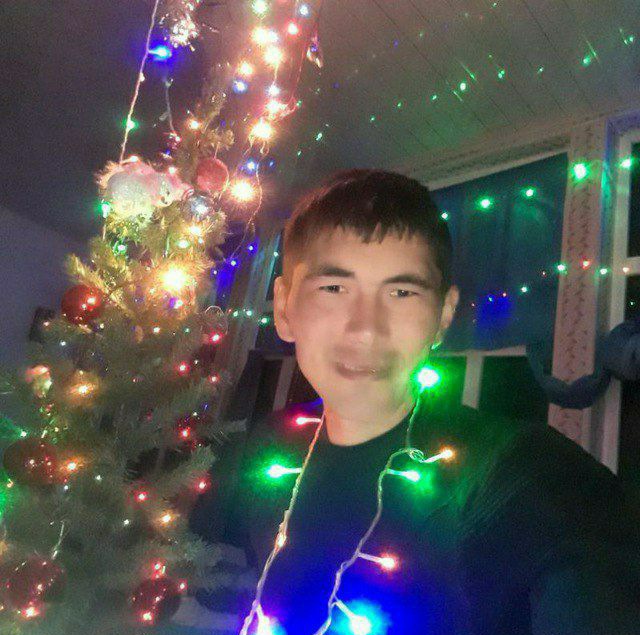
A NEW YEAR'S DREAM New year, renewed new dream, The birthday of the magic of goodness. Children's laughter is sonorous, The day of the awakening of love. He is the one who spreads anxiety, He is the one who freezes dust. A magic spell of hope, New year beauty, creator. The fairy tale also whispers sometimes, It rained on the magic box. The stranger who opposes him is sad, If you want an answer, happiness is a feeling. He takes you by the hand and leads you quietly, It will bring back memories for a moment. The place where the miles are ready to hit, It is better to say the impressions. New Year is the best wish and dream, Spread love to all hearts. Whoever makes the intention is kind, In the new year, you will surely reach your heart's content. NEW YEAR'S RINGTONES The sound of bells with drums and bells, Nice sweet bong sound. Let everyone gather and go out into the street, The flight of the reindeer drives the sleigh, Raise your hands up now, Let gifts pour in, see a miracle. Falling through the window into the chimney, Children's joy is a real miracle. Santa came with his sleigh Raise your hands and say a poem. Do not steal the joy from the face, Let the beacon of goodness shine. The world is like a magical fairy tale, If you make dreams, they will come true right now. Awakens love, a house full of guests, Embraces grief without a path. The New Year is coming, ring the bell, It's as if everyone is awake and happy. Happiness will fall from the sky, snow as white as the heart, The world is alive and growing. Ring the bell, ring the bell, Nice, nice bong sound. O'tkir Mulikboyev is a primary education teacher at school 75, Koshrabot district, Samarkand region, Republic of Uzbekistan and a student of the Primary Education department of ISFT Institute, Republic of Uzbekistan.
